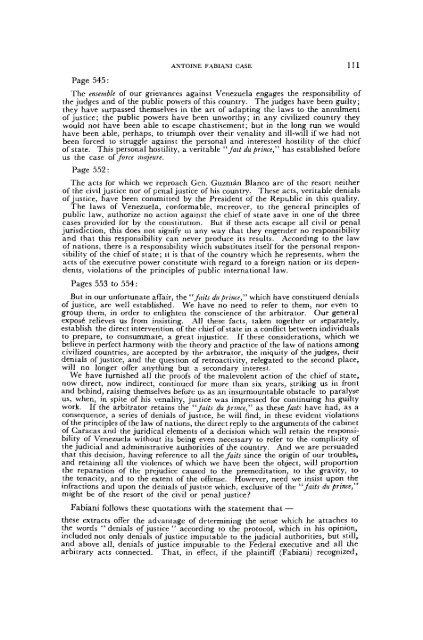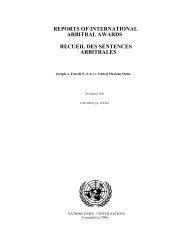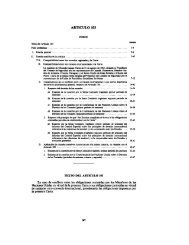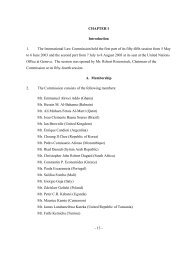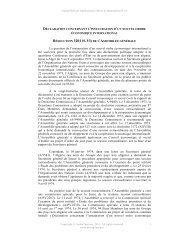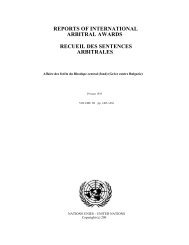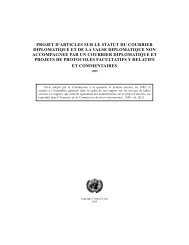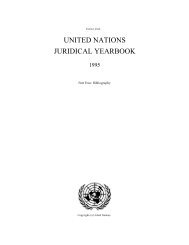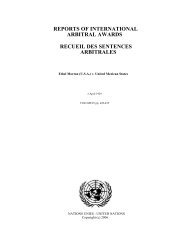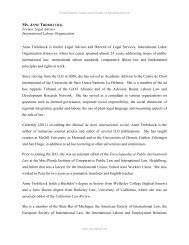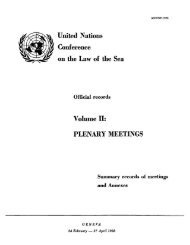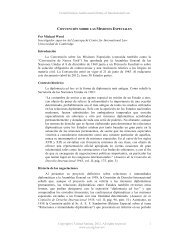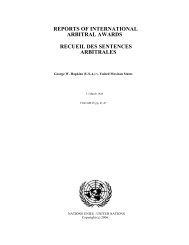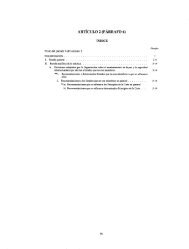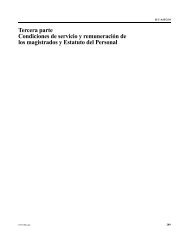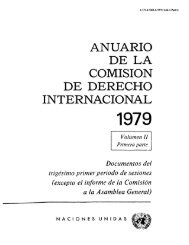Antoine Fabiani Case - United Nations Treaty Collection
Antoine Fabiani Case - United Nations Treaty Collection
Antoine Fabiani Case - United Nations Treaty Collection
Create successful ePaper yourself
Turn your PDF publications into a flip-book with our unique Google optimized e-Paper software.
Page 545 :<br />
ANTOINE FABIANI CASE 1 1 1<br />
The ensemble of our grievances against Venezuela engages the responsibility of<br />
the judges and of the public powers of this country. The judges have been guilty;<br />
they have surpassed themselves in the art of adapting the laws to the annulment<br />
of justice; the public powers have been unworthy; in any civilized country they<br />
would not have been able to escape chastisement; but in the long run we would<br />
have been able, perhaps, to triumph over their venality and ill-will if we had not<br />
been forced to struggle against the personal and interested hostility of the chief<br />
of state. This personal hostility, a veritable " Jait du prince," has established before<br />
us the case of jorce majeure.<br />
Page 552 :<br />
The acts for which we reproach Gen. Guzman Blanco are of the resort neither<br />
of the civil justice nor of penal justice of his country. These acts, veritable denials<br />
of justice, have been committed by the President of the Republic in this quality.<br />
The laws of Venezuela, conformable, mcreover, to the general principles of<br />
public law, authorize no action against the chief of state save in one of the three<br />
cases provided for by the constitution. But if these acts escape all civil or penal<br />
jurisdiction, this does not signify m any way that they engender no responsibility<br />
and that this responsibility can never produce its results. According to the law<br />
of nations, there is a responsibility which substitutes itself for the personal responsibility<br />
of the chief of state; it is that of the country which he represents, when the<br />
acts of the executive power constitute with regard to a foreign nation or its dependents,<br />
violations of the principles of public international law.<br />
Pages 553 to 554:<br />
But in our unfortunate affair, the "Jaits du prince" which have constituted denials<br />
of justice, are well established. We have no need to refer to them, nor even to<br />
group them, in order to enlighten the conscience of the arbitrator. Our general<br />
exposé relieves us from insisting. All these facts, taken together or separately,<br />
establish the direct intervention of the chief of state in a conflict between individuals<br />
to prepare, to consummate, a great injustice. If these considerations, which we<br />
believe in perfect harmony with the theory and practice of the law of nations among<br />
civilized countries, are accepted by the arbitrator, the iniquity of the judges, their<br />
denials of justice, and the question of retroactivity, relegated to the second place,<br />
will no longer offer anything but a secondary interest.<br />
We have furnished all the proofs of the malevolent action of the chief of state,<br />
now direct, now indirect, continued for more than six years, striking us in front<br />
and behind, raising themselves before us. as an insurmountable obstacle to paralyse<br />
us, when, in spite of his venality, justice was impressed for continuing his guilty<br />
work. If the arbitrator retains the "Jaits du prince," as these Jaits have had, as a<br />
consequence, a series of denials of justice, he will find, in these evident violations<br />
of the principles of the law of nations, the direct reply to the arguments of the cabinet<br />
of Caracas and the juridical elements of a decision which will retain the responsibility<br />
of Venezuela without its being even necessary to refer to the complicity of<br />
the judicial and administrative authorities of the country. And we are persuaded<br />
that this decision, having reference to all the jails since the origin of our troubles,<br />
and retaining all the violences of which we have been the object, will proportion<br />
the reparation of the prejudice caused to the premeditation, to the gravity, to<br />
the tenacity, and to the extent of the offense. However, need we insist upon the<br />
infractions and upon the denials of justice which, exclusive of the "jaits du prince"<br />
might be of the resort of the civil or penal justice?<br />
<strong>Fabiani</strong> follows these quotations with the statement that —<br />
these extracts offer the advantage of determining the sense which he attaches to<br />
the words "denials of justice " according to the protocol, which in his opinion,<br />
included not only denials of justice imputable to the judicial authorities, but still,<br />
and above all, denials of justice imputable to the Federal executive and all the<br />
arbitrary acts connected. That, in effect, if the plaintiff (<strong>Fabiani</strong>) recognized,


